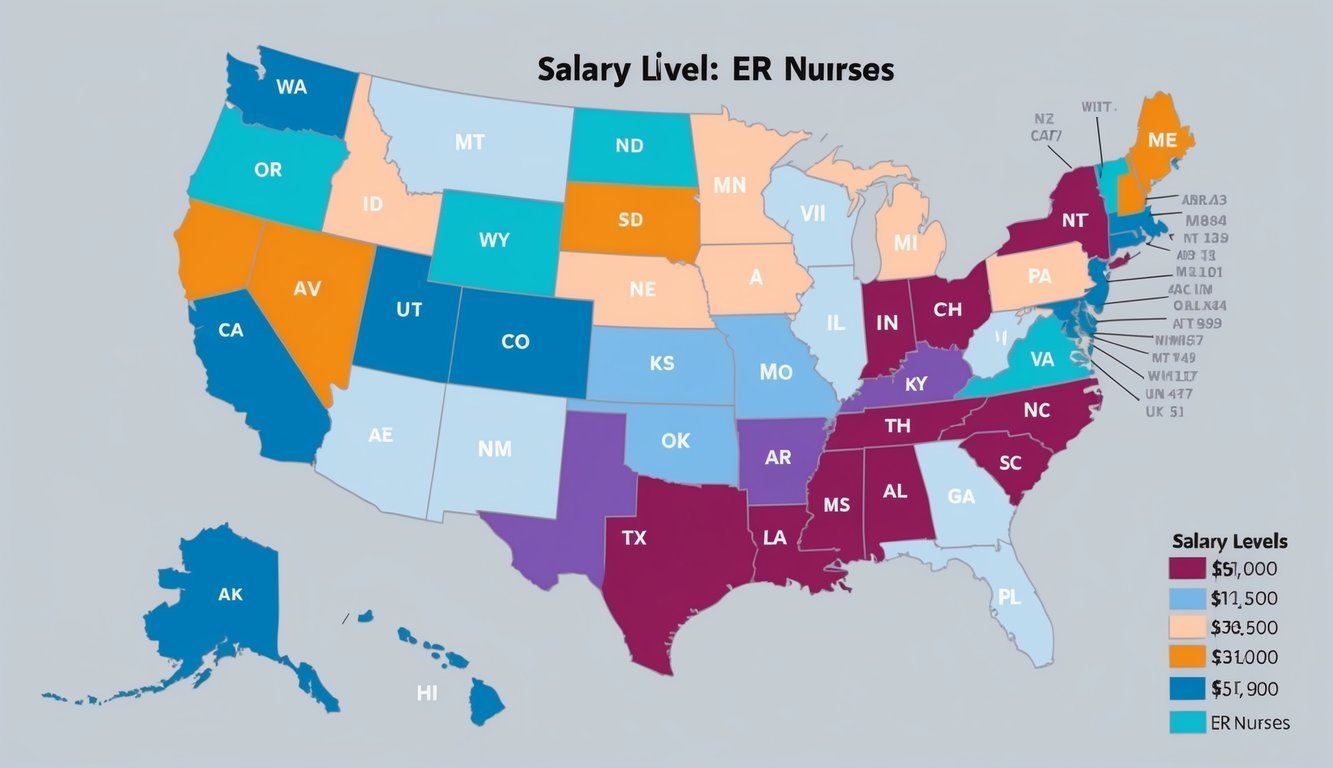As an aspiring or current Emergency Room Nurse, you need to understand your salary.
The average annual salary for an ER nurse is approximately $85,990.
Some ER nurses make over $124,580 depending on experience, location, and certifications.
This information is valuable as it helps you plan your career and understand how various factors can impact your earning potential.
In exploring ER nurse salaries, you will discover that education and certifications play significant roles.
You will also find that geographical differences can lead to salary variations.
Knowledge of these elements allows you to make informed decisions regarding your education and job opportunities in the field of nursing.
Key Takeaways
- The average ER nurse salary is around $85,990 annually.
- Location and qualifications significantly affect salary levels.
- Pursuing advanced practice and specializations can increase your earning potential.
Understanding ER Nurse Salaries
ER nurse salaries can vary based on multiple factors, including location, experience, and workplace.
Understanding these elements helps you see why salaries differ and how they compare to other nursing specialties.
Factors Influencing ER Nurse Pay
Several key factors affect the salary of an ER nurse. Location plays a significant role.
States like Alaska and Alabama report higher average salaries, reaching up to $159,431 and $133,615, respectively.
The cost of living in these states influences pay rates.
Your experience level also impacts your earnings.
According to data, newer nurses usually earn less than those with several years in the field.
Additionally, specialized certifications can provide opportunities for higher pay.
| Factor | Impact on Salary |
|---|---|
| Location | High variability |
| Experience | Higher pay with years |
| Certifications | Can lead to better pay |
Salary Comparisons with Other Nursing Specialties
When looking at ER nurse salaries, it’s helpful to compare them with other nursing fields.
The average salary for ER nurses is about $85,990 annually.
In contrast, telemetry nurses earn around $87,048, while OB nurses make approximately $83,242.
It’s important to note that some specialties pay significantly more.
For example, NICU nurses can earn as much as $128,211.
Understanding these comparisons helps you evaluate your career options in nursing.
| Nursing Specialty | Average Salary |
|---|---|
| ER Nurses | $85,990 |
| Telemetry Nurses | $87,048 |
| OB Nurses | $83,242 |
| NICU Nurses | $128,211 |
Education and Certification Requirements

Becoming an emergency room nurse requires specific educational pathways and certifications.
These qualifications ensure you have the necessary skills to handle high-pressure situations effectively.
Online Nursing Degree and RN-to-BSN Programs
To start your career as an emergency room nurse, you must first earn a nursing degree.
Many students opt for an Online Nursing Degree, which allows flexibility in scheduling while completing coursework.
Accredited programs often offer Bachelor of Science in Nursing (BSN) degrees, which are preferred by many employers.
If you are already a registered nurse (RN) looking to advance your qualifications, RN-to-BSN Programs are a great option.
These programs typically take 1-2 years to complete and focus on leadership, patient care, and advanced clinical skills.
| Program Type | Duration | Key Focus Areas |
|---|---|---|
| Online Nursing Degree | 2-4 years | Basic nursing, patient care |
| RN-to-BSN Programs | 1-2 years | Leadership, advanced skills |
Completing either program enhances your understanding of complex patient needs, which is crucial in the emergency room environment.
Board of Certification for Emergency Nursing
After gaining your degree, you can pursue certification through the Board of Certification for Emergency Nursing (BCEN).
This certification validates your skills and knowledge specifically in emergency nursing.
To qualify, you typically need an active RN license and some experience in emergency nursing.
The BCEN offers various certifications, including the Certified Emergency Nurse (CEN), which signals your expertise in this specialty.
Benefits of obtaining BCEN certification include:
- Increased job opportunities
- Higher potential salaries
- Recognition by peers
This certification not only improves your resume but also boosts your confidence in managing emergency situations effectively.
You can find more details on the certification process and requirements on the BCEN website.
Salary Variation by Geography

The salary for ER nurses can vary greatly depending on where you work.
Both cities and states play important roles in determining your pay.
Understanding these factors can help you make informed career decisions.
Highest Paying Cities
Certain cities offer significantly higher salaries for ER nurses.
Here are some of the top-paying locations:
| City | Average Salary |
|---|---|
| San Francisco, CA | $130,000 |
| New York, NY | $125,000 |
| Los Angeles, CA | $119,000 |
| Seattle, WA | $116,000 |
| Boston, MA | $112,000 |
These cities not only have higher average salaries but also higher living costs.
So, it’s essential to consider how your salary aligns with the cost of living.
For example, while you might earn more in San Francisco, housing can be significantly more expensive compared to rural areas.
Salary by State
State-wise salary variations can also impact your earnings.
Here are some states known for their high ER nurse salaries:
| State | Average Salary |
|---|---|
| California | $130,000 |
| New York | $125,000 |
| Texas | $90,000 |
| North Dakota | $97,700 |
| Oregon | $98,000 |
States like California and New York consistently top the list for ER nurse salaries.
In contrast, states with lower costs of living, like Texas, offer competitive but lower salaries.
Understanding where you can earn the most can help you choose your job location wisely.
For additional information on salary trends, check out resources like Nurse.org.
Advanced Practice and Specializations
In the field of emergency care, several advanced practice roles enhance patient outcomes and expand the scope of nursing.
Understanding these specializations can help you explore career options and focus on areas that interest you.
Nurse Practitioners in Emergency Care
Nurse Practitioners (NPs) play a critical role in emergency settings.
They are trained to assess, diagnose, and treat various conditions.
With an average salary of approximately $126,260, NPs in emergency care can earn significantly more based on experience and location.
Key responsibilities include:
- Evaluating patients upon arrival.
- Initiating treatment plans.
- Prescribing medications.
NPs often work alongside doctors to ensure patients receive comprehensive care.
Many pursue additional certification to specialize in emergency medicine, enhancing their skills and improving patient outcomes.
Their expertise allows for more efficient patient management, reducing wait times in busy emergency departments.
For further information on salaries, check out data on Nurse Practitioner salaries by state.
Certified Registered Nurse Anesthetists and ICU Nurses
Certified Registered Nurse Anesthetists (CRNAs) and Intensive Care Unit (ICU) nurses also play vital roles in healthcare.
CRNAs are responsible for administering anesthesia and monitoring patients during surgical procedures.
This specialty commands a high salary, often around $170,000 per year.
On the other hand, ICU nurses focus on critically ill patients.
Their salaries average about $100,000, reflecting the high-demand nature of their work.
Both positions require specific training and certifications:
| Role | Average Salary | Key Responsibilities |
|---|---|---|
| CRNA | ~$170,000 | Administer anesthesia, monitor patients |
| ICU Nurse | ~$100,000 | Care for critically ill patients, manage complex cases |
Understanding these specializations can help you identify paths to enhance your nursing career.
For more details on these roles and salaries, explore resources on advanced practice nurse specialties.
The Job Market Outlook
The job market for ER nurses is influenced by several factors, including the current nursing shortage and insights from various workforce surveys.
Understanding these elements will help you grasp the salary trends and job availability in this field.
Impact of Nursing Shortage on Salaries
The nursing shortage significantly impacts ER nurse salaries across the country.
With a projected need for an additional 177,400 nurses by 2032, hospitals are increasing pay to attract qualified candidates.
This shortage arises from various factors, including an aging population and a retiring workforce.
As hospitals compete for talent, salaries for ER nurses are climbing.
The average salary for ER nurses is approximately $93,405 per year, with some regions paying much more due to demand.
This trend suggests that if you are considering a career in this field, you could expect competitive wages.
Key Findings from Nursing Workforce Surveys
Recent nursing workforce surveys provide valuable insights into the challenges and opportunities in the nursing profession.
For instance, a survey indicated that a significant number of nurses plan to leave their jobs within the next few years due to burnout and job dissatisfaction.
Additionally, data shows a growing interest in flexible work schedules and better benefits among nurses.
As a result, employers are adjusting their offers to include bonuses and other incentives, which can directly affect your decision to join this field.
Frequently Asked Questions

When considering the salary of an ER nurse, various factors come into play.
These include geographic location, experience, education, and specific compensation policies of hospitals or healthcare facilities.
What factors influence the salary of an ER nurse in the United States?
Several factors impact the salary of an ER nurse.
These include the cost of living in the area, demand for nurses, and the healthcare facility’s budget.
Additionally, your level of experience and educational background, such as whether you hold a BSN, can also affect your earnings.
How does ER nurse compensation vary by state or region?
ER nurse salaries can differ significantly across states.
For example, Alabama has an average salary of about $133,615 per year, while Alaska averages around $159,431 annually.
High demand in certain regions often leads to higher pay.
What is the typical hourly wage for an ER nurse?
ER nurses typically earn an average hourly wage of around $42.
Some specialized ER nurses may earn more.
Their hourly wages can go up based on specific skills or roles.
This figure can vary based on location and facility.
Are ER nurses compensated differently based on experience or education level?
Yes, your experience and education can affect your salary.
Entry-level ER nurses tend to earn less than those with several years of experience.
Additionally, higher degrees, such as a Master’s in Nursing, can lead to better compensation opportunities.
How does the salary of a new graduate ER nurse compare with that of an experienced ER nurse?
A new graduate ER nurse can expect to earn significantly less than an experienced nurse.
While a newcomer might start with an average salary of around $78,039 per year, experienced nurses can earn well into the six figures.
The exact amount depends on their location and roles.
What is the potential salary progression for an ER nurse over their career?
As you gain experience and expertise, your salary as an ER nurse can progress.
Many nurses see pay increases as they move into higher positions, such as nurse manager or specialized roles.
On average, ER nurses can expect salary growth over time with proper experience and continued education.

